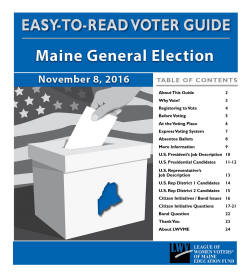Voter’s Guides to the Maine Initiatives: Marijuana, education tax, gun background check, minimum wage, ranked choice voting
The League of Women Voters of Maine and the Maine Secretary of State have both produced in-depth and information guides to the five initiatives and one bond measure that is before all Maine voters this Nov. 8. Their easy-to-read publications also provide information on other questions and candidates.
Here are links to both:
Easy to Read Voter Guide, Maine General Election (League of Women Voters)
The Maine Secretary of State has compiled a Nov. 8, 2016, Maine Citizen's Guide to the Referendum Election.
The League has posted the following intro to each initiative:
An Act to Legalize Marijuana “Do you want to allow the possession and use of marijuana under state law by persons who are at least 21 years of age, and allow the cultivation, manufacture, distribution, testing, and sale of marijuana and marijuana products subject to state regulation, taxation and local ordinance?”
What this question means: This initiative allows adults (21 or older) to have or grow a limited amount of marijuana. It will create rules for the sale, testing, production, and transportation of marijuana and related products by licensed businesses. Cities and towns will have the right to prohibit marijuana businesses. A 10% tax on recreational marijuana sales will help put rules and regulations in place and enforce them. Using marijuana in public will still be illegal.
An Act to Establish the Fund to Advance Public Kindergarten to Grade 12 Education “Do you want to add a 3% tax on individual Maine taxable income above $200,000 to create a state fund that would provide direct support for student learning in kindergarten through 12th grade public education?”
What this question means: This initiative would increase state funding for K-12 education by placing a 3% tax on people with income above $200,000. Under Maine law, the state and cities/towns share in the cost of K-12 education funding. This added funding would help the state meet the target of funding 55% of the overall cost of K-12 education.
An Act to Require Background Checks for Gun Sales “Do you want to require background checks prior to the sale or transfer of firearms between individuals not licensed as firearms dealers, with failure to do so punishable by law, and with some exceptions for family members, hunting, self-defense, lawful competitions, and shooting range activity?”
What this question means: Licensed dealers already require background checks. This law would require background checks for private purchases of guns with some exceptions.
An Act to Raise the Minimum Wage “Do you want to raise the minimum hourly wage of $7.50 to $9 in 2017, with annual $1 increases up to $12 in 2020, and annual cost-of-living increases thereafter; and do you want to raise the direct wage for service workers who receive tips from half the minimum wage to $5 in 2017, with annual $1 increases until it reaches the adjusted minimum wage?”
What this question means: This law would raise the minimum wage across the state. The minimum hourly wage now is $7.50. In 2017, the hourly wage would be $9.00, and would increase by $1.00 each year until it reaches $12 on January 1, 2020. After 2020, the minimum wage would increase at the rate of inflation. The minimum wage for employees who earn tips has always been lower than for employees who do not earn tips. This law would increase the minimum wage for employees who earn tips to $5.00 an hour beginning January 1, 2017. Starting in 2018, the minimum wage for tipped employees would increase by $1.00 per hour until it is equal to minimum hourly for other employees.
An Act To Establish Ranked-Choice Voting “Do you want to allow voters to rank their choices of candidates in elections for U.S. Senate, Congress, Governor, State Senate, and State Representative, and to have ballots counted at the state level in multiple rounds in which last-place candidates are eliminated until a candidate wins by majority?”
What this question means: This new law will change the way we vote for Governor, U.S. Senators, U.S. House of Representatives, State Senators, and State Representatives. If the new law is passed, voters will rank candidates in order of preference. Voters may rank as many or as few candidates as they choose. If one candidate is the first choice of the majority of voters, that candidate wins. If not, the candidate with the fewest first choice rankings is eliminated, and the voters who made that candidate their top choice have their votes given to their second choice. This process repeats until a candidate has a majority of the votes.
“Do you favor a $100,000,000 bond issue for construction, reconstruction and rehabilitation of highways and bridges and for facilities, equipment and property acquisition related to ports, harbors, marine transportation, freight and passenger railroads, aviation, transit and bicycle and pedestrian trails, to be used to match an estimated $137,000,000 in federal and other funds?”
What this question means: The State would borrow $100 million to improve and repair highways, bridges, harbors, ports, railroads, airports, and walking trails. If the bond passes, an additional $137 million would come from the federal government and other sources
Event Date
Address
United States




























